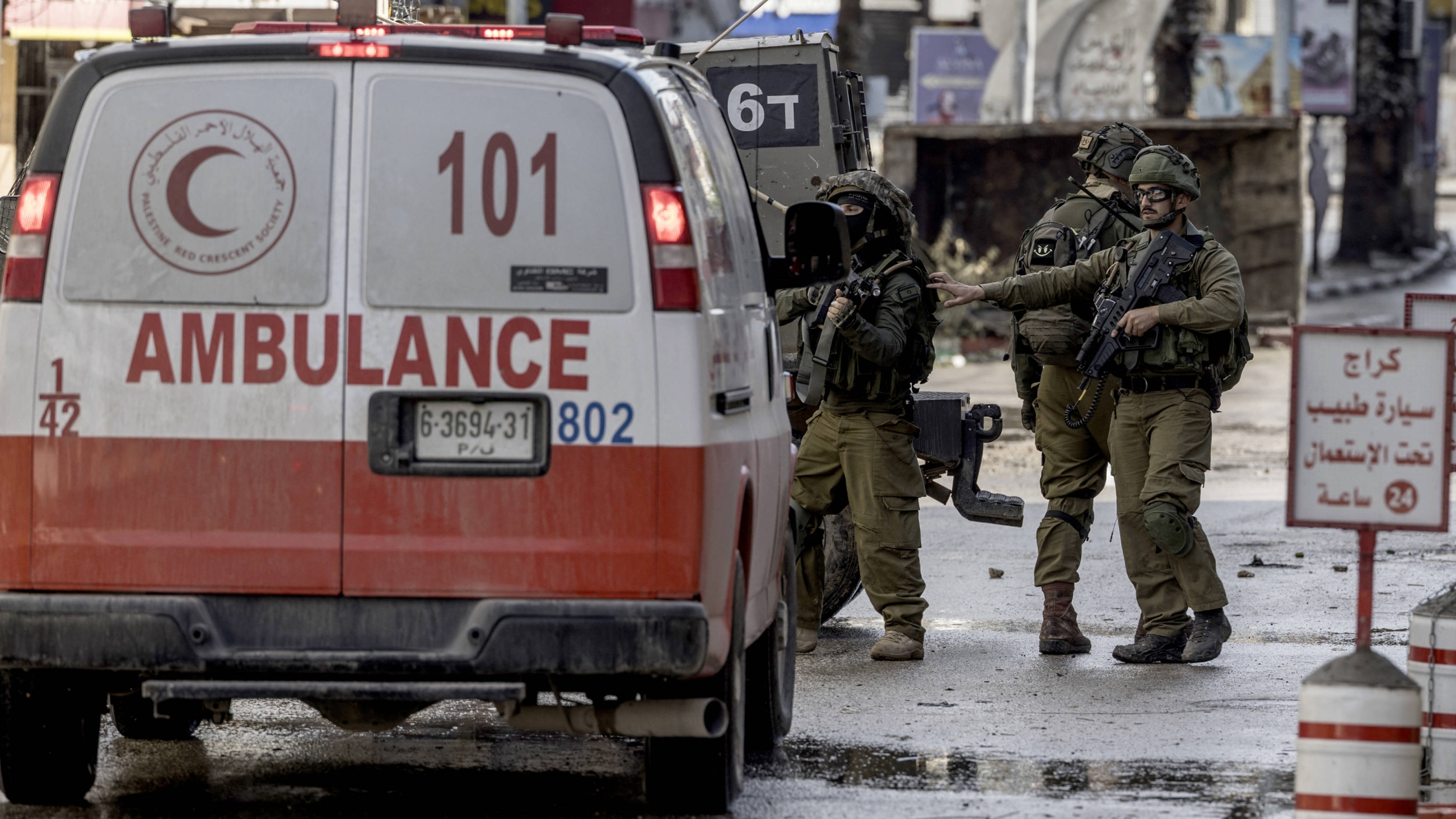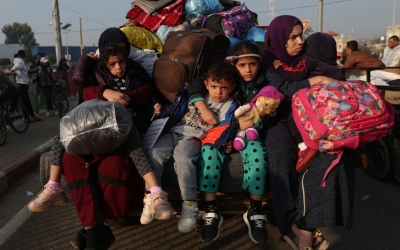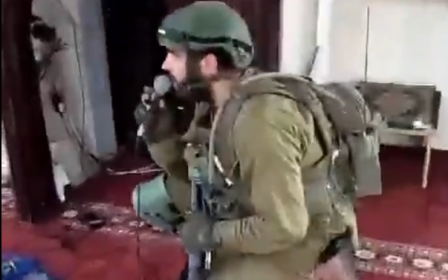Israel-Palestine: Israeli forces block ambulances from reaching besieged hospitals in Jenin

The Israeli army has been obstructing the access of ambulances to hospitals on their way to transport Palestinians who have been wounded in an ongoing large-scale raid on Jenin city, now in its third day.
At least 12 people have been killed and dozens wounded since the Israeli military launched a raid on Jenin and its refugee camp on Tuesday. Israeli forces have also besieged hospitals in the city, blocking anyone from entering or exiting.
On Thursday, soldiers shot and killed a 17-year-old boy, Musa Khatib, inside the Khalil Suleiman Hospital compound, Doctors Without Borders (MSF) said in a post on X.
MSF also said that Israeli forces have stopped ambulances outside the hospital from transporting discharged patients home.
"Paramedics and ambulance drivers were ordered out of the ambulances, stripped and made to kneel in the street. The patients were left in the ambulances," it said.
Stay informed with MEE's newsletters
Sign up to get the latest alerts, insights and analysis, starting with Turkey Unpacked
"All of this happened in full view of our team."
First responders told Middle East Eye that Israeli forces have also been blocking ambulances from transportimg to hospitals people who have been wounded in the raid.
Among them was Fouad Abahra, 36, who was shot on Tuesday afternoon and bled to death in the ambulance as the medical team waited for the soldiers to allow them passage.
Most of the wounded in the raid have either been denied access to medical care or arrested from inside ambulances.
Obstructing ambulances
Ambulance driver Khaled al-Ahmed told Middle East Eye that Abahra was hit by a bullet in the thigh and suffered severe bleeding.
A medical team that had reached Abahra and tried to provide him with first aid was interrupted and harassed by Israeli soldiers. The crew was initially stopped from transferring him to the ambulance.
'The paramedics were demanding that the wounded be transported immediately, but the soldiers didn’t respond and kept pointing their weapons at the ambulance'
- Mahmoud Zakarna, journalist
"However, our crew insisted on completing their mission and we succeeded in transferring him to the ambulance, but when we tried to move towards the hospital, the soldiers stood in our way and prevented us on the pretext that they wanted the wounded person’s identity card, which he wasn’t carrying," Ahmed said.
Checking the identity cards of the wounded is a new policy that the Israeli army has adopted since the start of the war on Gaza, especially in the city of Jenin, in an attempt to arrest "wanted persons".
The medical crew then informed the soldiers that Abahra’s condition was critical and he was in need of urgent medical care, but to no avail.
"In an attempt to speed up the transfer process, we asked the soldiers to let us move a second ambulance to go to his house and bring the identity card," Ahmed said.
The soldiers held up the ambulance for more than half an hour, a delay that led to Abahra bleeding out and dying inside the ambulance.
Journalist Mahmoud Zakarna from Jenin told MEE that a number of residents recognised Abahra and told the soldiers his name, but they still refused to let the ambulance pass without obtaining his identity card first.
"The paramedics were screaming and demanding that the wounded be transported immediately, but the soldiers didn’t respond and kept pointing their weapons at the ambulance, preventing it from moving," he said.
Dead on arrival
Meanwhile, sick Palestinians weren't able to reach hospitals as the raid was underway.
The Palestinian health ministry said that a 13-year-old special needs boy, Ahmed Samar, died on Tuesday because his father couldn’t make it to the Khalil Suleiman Hospital due to the violence.
Zakarna said that while he was filming the Israeli military storming the city, he saw a man walking in the street as he carried his child, trying to reach the hospital.
Follow Middle East Eye's live coverage for the latest on the Israel-Palestine war
Samar had fallen seriously ill at home in the town of Yamoun, west of Jenin, that morning. His father first drove him by car to the city, but the roads were blocked due to the raid, leaving him with no choice but to carry his son on foot.
Samar arrived at the hospital dead.
The Palestinian Red Crescent Society said in a statement that the humanitarian situation in Jenin camp is deteriorating as a result of the ongoing raid.
There have been dozens of calls and requests for help that ambulances have not been able to answer because of Israeli obstructions, despite prior coordination, according to the statement.
The Red Crescent said dozens of citizens are also in need of baby milk and bread but have not been allowed to leave their homes in days.
Hospitals under siege
During the recent raids on Jenin, the Israeli army has repeatedly besieged the hospitals in the city and prevented medical teams from moving outside.
"Since 7 October, we have seen Israeli forces fire live bullets at the (Khaled Suleiman) hospital, tear gas the hospital, block ambulances, humiliate and harass medical staff, and now – shoot and kill someone in the hospital compound," the MSF had said after Musa was killed.

Wissam Bakr, director of the Jenin Governmental Hospital, said that Israeli army vehicles had started their invasion of the city this week by besieging his hospital and preventing ambulance crews from leaving it.
The blockade hasn't only affected the wounded, he added, but also prevents sick people from reaching the hospital, including those with kidney failure, tumours, and maternity cases.
Two ambulances had come under Israeli fire while transporting patients suffering from kidney failure to the government hospital in Jenin.
"In addition to the state of confusion caused by the presence of military vehicles in the vicinity and courtyard of the hospital, the soldiers have also fired tear gas that reached into the hospital and caused many patients and employees to suffocate," Bakr said.
Bakr added that the military's request for identity cards of the wounded as they are being transported is "a very dangerous measure" that medical teams in the city have repeatedly warned against.
Additionally, during the attack on the hospital, a number of premature babies were at risk of inhaling the tear gas being fired at the courtyard adjacent to their ward.
The nurses had to move them all to another, smaller room to protect them from suffocation.
Middle East Eye delivers independent and unrivalled coverage and analysis of the Middle East, North Africa and beyond. To learn more about republishing this content and the associated fees, please fill out this form. More about MEE can be found here.




